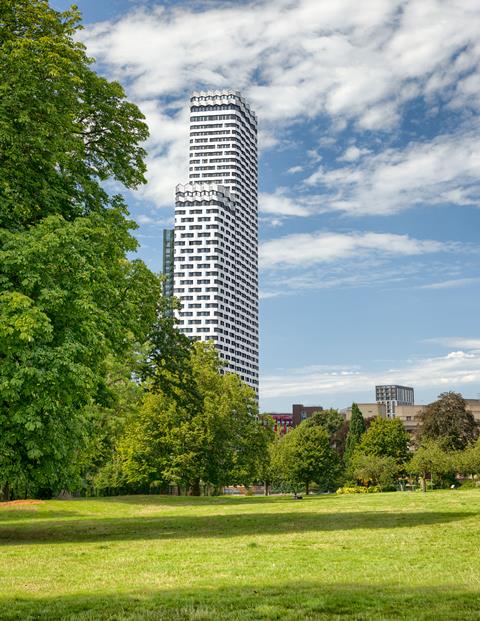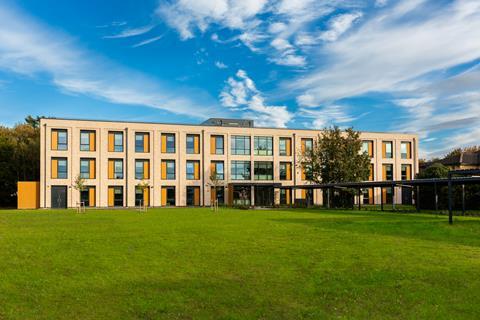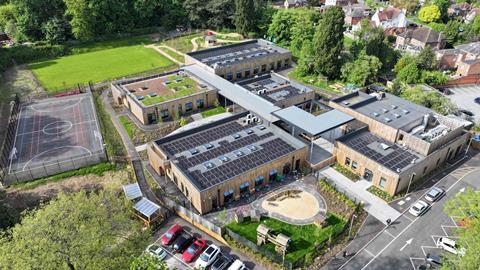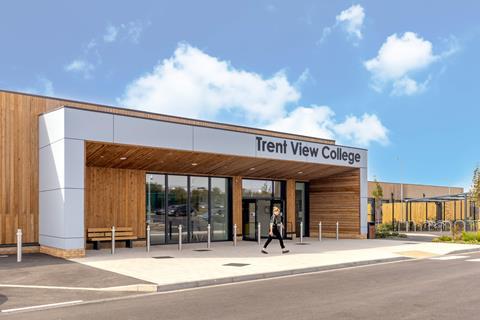In a series celebrating Building’s Building Awards finalists, we look at the MMC Award shortlist
Earlier this year Building announced all the firms who made it on to the shortlists for our prestigious annual Building Awards.
Now we are shining the spotlight on each category in turn and publishing a selection of the images that impressed the judges.
Today’s shortlist is for MMC Award.
College Road, Croydon
Entered by Tide Construction / Vision Volumetric

Tide Construction and Vision Modular Systems have set a new benchmark in volumetric construction with the College Road project in Croydon.
This historic milestone comprises two interconnected buildings: a 35-storey tower with 120 affordable homes and a 50-storey tower with 817 co-living homes, making it the world’s tallest volumetric building.
The project delivered approximately 1,000 homes in just 28 months, three months ahead of schedule and on budget. The innovative approach used parallel workstreams, manufacturing an average of 45 volumetric units per week.
This method resulted in significant time savings and improved safety on site. The development also prioritised sustainability, achieving a high EPC B rating and BREEAM Excellent certification. The project’s success extends beyond its construction achievements, offering high-quality, fully furnished accommodation with seven floors of amenity space.
The scheme’s striking facade, featuring bold articulation of glazed terracotta, contributes to the urban renewal of Croydon. College Road demonstrates the potential of volumetric construction to deliver large-scale, high-quality housing quickly and efficiently. The project team overcame challenges such as limited collapse radius due to proximity to Network Rail and Tram Lines, implementing a detailed craneage strategy for volumetric installation.
Join us for the 30th edition of the Building Awards
This year’s event will take place at the Grosvenor House Hotel on 5 November.
There are 21 categories to enter, so make sure you are in the room for construction’s night of nights and to celebrate excellence.
Tickets are selling fast, so secure your place today.
Imjin Barracks smart SLA
Entered by Reds10

Reds10 delivered a groundbreaking single living accommodation (SLA) project at Imjin Barracks, Gloucestershire, for the British Army.
The three-storey building, constructed using MMC techniques, provides modern, sustainable accommodation for 400 troops from over 20 allied nations.
Utilising 3D volumetric offsite construction, the project was completed in just 14 months, with units arriving on site up to 90% complete. This approach enabled a significantly faster programme delivery, increased security and health and safety measures, and reduced disruption to the active military location.
The SLA incorporates advanced sustainability features, including photovoltaic panels, air-source heat pumps, and nano crystal cell battery technology.
As one of Europe’s most advanced smart buildings, it achieved over 95% on the Smart Readiness Indicator. Reds10’s innovative system processes 21,000 data points, optimising the building’s operational performance and maintenance.
Reds10’s collaboration with armed forces personnel during the design phase allowed for tangible design changes, tailoring the space to specific needs. The project’s success has already influenced subsequent projects in the Army SLA Programme, demonstrating Reds10’s ability to deliver cutting-edge, user-centric solutions that enhance the lived experience of military personnel.
St Mary’s Catholic Voluntary Academy
Entered by Tilbury Douglas

Tilbury Douglas delivered St Mary’s Catholic Voluntary Academy in Derby, a trailblazing GenZero pilot school for the Department for Education.
Tilbury Douglas’s collaborative approach with the client and end-users resulted in a flexible, sustainable and cost-effective solution that sets a new standard for educational facilities in the UK.
The project embraces key Construction Playbook themes, achieving net zero carbon in operation, low embodied carbon, and serves as a MMC exemplar. As the first UK school to incorporate biophilic design principles, St Mary’s promotes positive health and wellbeing through connection with nature.
The innovative design comprises five single-storey buildings linked by a central covered spine, each terminating in an external communal space. The use of Innovaré’s offsite structural insulated panel system enabled a fast-track delivery programme, completing the project within 11 months.
The school’s design optimises natural light and outdoor access, with full-height triple-glazing in every space. The project’s sustainability features, including photovoltaic panels and air-source heat pumps, are also notable. Tilbury Douglas’s commitment to social value is evident, with more than £6m spent with local trades, 27 work experience weeks, and 528 apprentice weeks on the project.
This year’s judges
- Yetunde Abdul, director of industry transformation, UKGBC;
- Bola Abisogun, founder, Digital Twin Skills Academy CIC;
- Brian Berry, chief executive, Federation of Master Builders;
- Rachel Bell, director of partnerships, Stride Treglown;
- Anna Clarke, director of policy and public afffairs, Housing Forum;
- Mark Cleverly, partner, CPC;
- Joanne De La Porte, senior sirector - project management, Gleeds;
- Katy Dowding, CEO and president, Skanska UK;
- Karen Gidwani, partner, Fenwick Elliott;
- Kay Hughes, design director, HS2;
- Ellie Jenkins, partner, Akerlof;
- Félicie Krikler, director, Assael;
- Doris Lam, development director, EcoWorld London;
- Liz Male, founder, LMC;
- John Marland, chief development officer, Bruntwood;
- Flan MacNamara, construction director, Sellar;
- Kamran Moazami, executive managing director, property & buildings, WSP;
- Robin Nicholson, fellow, Cullinan Studio;
- Iain Parker, director, T&T Alinea,
- Simon Rawlinson, head of strategic research and insight, Arcadis;
- Mark Robinson, chief executive, Scape Group;
- Veronica Senior, senior manager global captial projects, Lloyd’s;
- Scott Sanderson, partner, PRP;
- Neal Shasore, head of school | CEO, London School of Architecture;
- Trudi Sully, UK & Europe lead - industrialised design & construction, Mott MacDonald
- Lynne Sullivan, chair, National Retrofit Hub;
- Gauri Talathi-Lamb, chief executive, FHP ESS;
- Martha Tsigkari, senior partner and head of the applied R+D group, Fosters + Partners,
- Jo Wright, director, Perkins&Will
Trent View College
Entered by HLM Architects

HLM Architects designed Trent View College, one of the first special educational needs and disability (SEND) facilities in the world to achieve Passivhaus standards.
The college in Scunthorpe, catering for 60 post-16 SEND pupils, offers a nurturing space for students to acquire vital life skills and develop routes towards independence, with HLM working closely with the trust and the Department for Education team.
The project’s success demonstrates the benefits of offsite construction and collaborative design approaches, with the design incorporating innovative technical solutions, including cross-laminated timber panels for the superstructure and roof, chosen to achieve strict airtightness criteria, and a high-performance thermal envelope.
A bespoke Passivhaus-compliant vehicle entrance door was developed for the motor vehicle workshop, exemplifying the project’s commitment to combining technical ingenuity with rigorous performance standards.
The college’s variety of teaching facilities, including a mechanical workshop, hydrotherapy pool and salon, enables students to develop important life skills. Sustainability is also at the core of the design, with the building minimising heat loss and maximising energy efficiency. The outcome of the project is a sustainable, contemporary and exemplary educational facility that will serve the community for years to come.




























